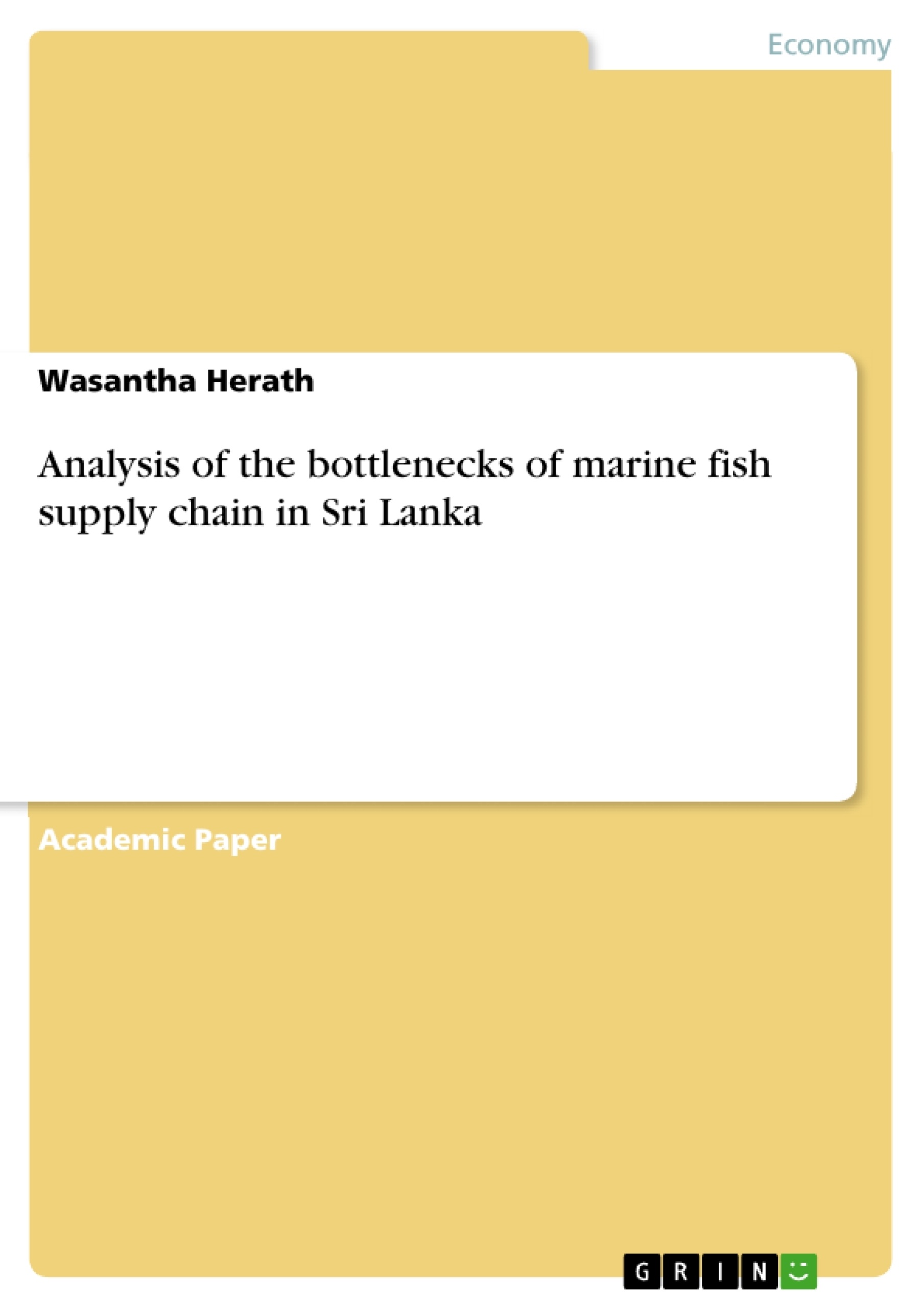Supply Chain Management and Logistics are the most significant factors for the commercial marine fish supply chain; the study has considered only the Marine Fish Supply Chain (MFSC) for local markets in Sri Lanka. The Supply Chain helps to assess the efficiency of the marketing and distribution system while finding ways to improve well-performed and efficient supply chain management. Objectives were established to analyse marine fish supply chain, its main aspects, and actors and bottlenecks in the local market, understanding and analysing of preventive measurements of bottlenecks to give recommendations. Main bottlenecks are lack of marketing strategies, market structure constrains, lack of proper information flow, and inadequate infrastructure facilities.
The study used two data types for the analysis as primary data and secondary data. Primary data was gathered from the responders, i.e. fishermen, consumers, and locations such as primary, wholesale, and retail markets. Secondary data were gathered from government institutions’ reports, text books, printed journals, e-journals, and websites. Recommendations were made according to the findings, which can be used as the corrective and preventive measures.
The study analysed data using most suitable analytical methods including fishbone analysis, marketing margin, marketing efficiency index, average net share of the consumer price, and fisherman share of one consumer rupee. Fishermen are assured of a fair price for harvest, the best quality preferred species for affordable prices for consumers, consumer satisfaction, elimination of stagnant position of supply chain, and higher contribution for the Gross Domestic Product (GDP).
Inhaltsverzeichnis (Table of Contents)
- I. BACKGROUND
- Table 01: Background Information of Marine Fisheries Industry of Sri Lanka
- II. RESEARCH PROBLEM
- III. OBJECTIVES
- The Main Objective
- Specific Objectives
- İ.
- ii.
- iii.
- IV. RSEARCH QESTIONS
- V. SCOPE OF RESEARCH
- Supply Chain Management (SCM).
- Logistics
- Theory of Constraints (TOC).
- VI. METHODOLOGY
- Lack of Empowerment.....
- Lack of Infrastructure
- Lack of Marketing Orientation
- Lack of Security......
- Nonexistence of Branding
- VII. DATA PRESENTATION AND BOTTLENECK ANALYSIS
- Fishbone Analysis of MFSC Bottlenecks.
- Average Net Share of the Consumers' Price
- Marketing Margin (MM).....
- Marketing Efficiency Index.
- Fishermen's Share of One Consumer Rupee........
- Oligopolistic Buying Pattern at Landing Centres (Primary Market)
- Lack of Empowerment of Fishermen
- Fisherman Share in Consumer Rupee (LKR).
- Marketing Margins (MM).
- Lack of Security at Landing Centres and Insufficient Legal Protection
- Involvement of Intermediaries/Middlemen
- Oligopolistic Buying Pattern at Landing Centres (Primary Market)
- High Risk for Supply Uncertainty, Lost Harvest, and Crew Safety...\n
- Low Level Quality Maintenance and Processing.\n
- Poor Usage of Information Technology...\n
- Inadequate Infrastructure Facilities
- Poor Application of Marketing Strategies
- Non-existence of Branding.\n
- Lack of Empowerment of Fishermen
- VIII. DISCUSSION CONCLUSION AND RECOMMENDATION
- Discussion and Conclusion
- Recommendations...........
- Overcoming Oligopolistic Buying Pattern at Landing Centres (Primary Market)......
- Involvement of Intermediaries/Middlemen…..........\n
- Mitigation of High Risk for Supply Uncertainty, Lost Harvest, and Crew Safety.\n
- Branding
- IX.PLANNING CHARACTERISTICS
- Short-Term Development Plan......
- Medium-Term Development Plan.
- Long-Term Development Plan...........
- X.RECOMMENADATIONS FOR FUTURE RESEARCH
- References.
Zielsetzung und Themenschwerpunkte (Objectives and Key Themes)
This study aims to analyze the bottlenecks in the marine fish supply chain in Sri Lanka, identify the key aspects and actors involved, and understand the challenges in the local market. The study emphasizes the need for effective supply chain management and logistics to improve performance and address the challenges faced by fishermen, consumers, and the overall industry.
- Analyzing the marine fish supply chain in Sri Lanka, its main aspects and actors.
- Identifying and examining the major bottlenecks in the supply chain.
- Exploring strategies to enhance supply chain performance and overcome bottlenecks.
- Understanding the role of marketing strategies, market structure, information flow, and infrastructure in the supply chain.
- Providing recommendations for corrective and preventive measures to improve the efficiency and sustainability of the marine fish supply chain.
Zusammenfassung der Kapitel (Chapter Summaries)
The initial chapters provide a comprehensive background on the Sri Lankan marine fisheries industry, highlighting its importance, current state, and challenges. The research problem is then presented, emphasizing the need for a detailed analysis of the supply chain and its bottlenecks. The study's objectives and research questions are outlined, focusing on understanding the marine fish supply chain, identifying bottlenecks, and exploring solutions for improvement.
The scope of research delves into key concepts and areas of focus, including supply chain management, logistics, and the theory of constraints. The methodology adopted for data collection and analysis is described, including the use of primary and secondary data, and the selection of specific fish species for analysis.
The chapter on data presentation and bottleneck analysis provides a detailed account of the findings, using various analytical methods like fishbone analysis, marketing margin, marketing efficiency index, and average net share of the consumer price. This section highlights the significant bottlenecks in the supply chain, including the lack of empowerment for fishermen, inadequate infrastructure, poor marketing strategies, and security concerns.
Schlüsselwörter (Keywords)
The primary focus of this research revolves around the marine fish supply chain in Sri Lanka. The key terms and concepts include marine fish supply chain, marine fish markets, supply chain bottlenecks, logistics, marketing strategies, infrastructure, consumer demand, and sustainable development.
- Arbeit zitieren
- Wasantha Herath (Autor:in), 2020, Analysis of the bottlenecks of marine fish supply chain in Sri Lanka, München, GRIN Verlag, https://www.hausarbeiten.de/document/514975


